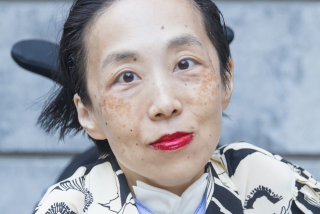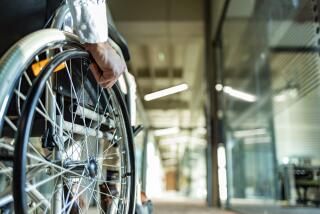Life Less Than Perfect Is Still Worth Living : ‘Dying with dignity’: Nurturing the disabled, rather than pulling the plug, can give us better perspectives on existence.
- Share via
Increasingly these days, we notice a swelling number of articles espousing the “right to die with dignity,” especially involving the very young who are gravely retarded, maimed or disabled.
As a young intern and resident years ago, I had a similar viewpoint. I thought I knew it all, and in a way, I did, My mistake was that I had a narrow perspective on life, not realizing that what appeared to be misfortunes really were not.
Now, my perspective after 23 years of practicing medicine--as a doctor, neurologist, professor and father--has broadened to see that disabled children can become wonderful loving beings who often change the course of their families’ focus from the pursuit of “happiness” and wealth to the pursuit of service to those in need.
I offer two examples, that of my wife and I, and that of two dear friends, Ruben and Martha Lujan.
Thirteen years ago, I was called to a hospital’s emergency room because our 4-year-old daughter, Kaycee, was ill. I was horror-stricken to see her cherubic little face ashen and gray; only a convulsive twitch in her eyes told me she was still alive.
“What are you waiting for, do something,” I cried out to the attending doctor and nurses. The doctor meekly replied, “We hoped you would know what to do.”
An overwhelming terror swept through me as I realized what my daughter had--she was in an epileptic state, probably with Reyes’ syndrome. I had given her aspirin for some muscle cramps that morning and sent her to nursery school. Reyes’ syndrome is a malignant brain disease, which at that time killed 50% of those afflicted and impaired and scarred the brains of 30% to 40% of those who survived.
My wife and I accompanied Kaycee in the ambulance to Childrens Hospital. On the way, she stopped breathing and I feverishly began mouth-to-mouth resuscitation, trying to breath my life into her with each breathe.
Tears streamed down my face as my baby was wheeled away, confining me--a clinical professor of neurology--to the emergency room waiting area.
Eventually, a doctor came out to see us. She said quietly to me, “You’re a doctor, aware of the diagnosis and the dire outcome. I advise that we stop further resuscitation so you won’t be burdened, at best, with a badly crippled child.”
I will never forget her face as I replied, “Doctor, that’s my baby girl. I’ll never give up on her. Nor will you!”
Kaycee came out of the coma four days later, paralyzed and unable to speak.
Four years later, she won her first race at school, and at 14, she was grand national karate champion--at 15 the first person, man or woman, to win the title twice consecutively. Now she prepares to go to college. For me, that day at Childrens Hospital changed my life as a physician and father.
All stories, however, do not turn out like ours.
The experience of Ruben and Martha Lujan has been fraught with severe hardships and extremely high expenses. Their baby, Martha, suffered from a similar brain disease. Now 25, she is severely retarded and spastic, barely able to move about.
Her arrival into this deeply devout and closely knit family provided a new inspiration as both parents and children joined in providing a caring and loving atmosphere for their daughter and sister.
Ruben, a photo company technician, and Martha, who stayed home to take care of their children, were so inspired to help others that, in their 40s, both fought their way through college to earn degrees in social work. Martha has earned her master’s degree and has offers from Harvard University to work toward her doctorate.
Their experience with their disabled daughter has made them a beacon of hope for thousands of Angelenos with similar problems, and even more, to those who are healthy but seek a deeper meaning of life. You see, they saw meaning in adversity. They saw life as continuous, as a contrast between good and bad, beautiful and ugly, athletic and disabled, intelligent and retarded.
The disabled and downtrodden often give us a better perspective on life than the beautiful and perfect, because the imperfect remind us of what is important in life--to give, to love, to be happy with what we have, and to help one another.


